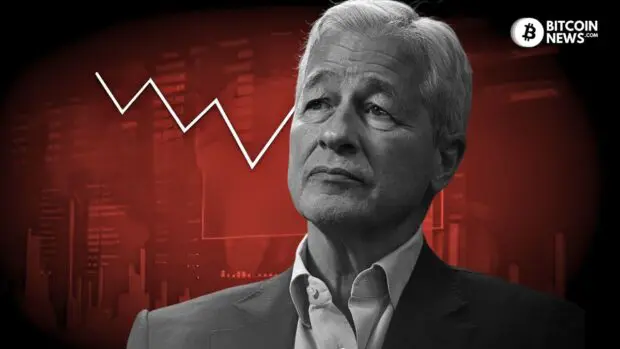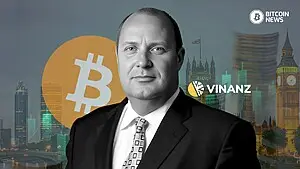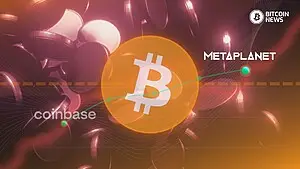The CEO of JP Morgan Jamie Dimon recession warnings continue to sound the alarm for everyone. In his recent statements, Dimon talked about potential economic risks, citing concerns over inflation, interest rates, and geopolitical tensions.
JP Morgan Jamie Dimon Recession Warnings: A Cautionary Outlook
Jamie Dimon, the prominent figure at JPMorgan Chase, expressed concern about the economic landscape at the New York Times DealBook Summit on Wednesday. He raised flags about potential challenges ahead. His recent warnings emphasize the need for preparedness amid looming uncertainties.
Dimon highlights inflation as a critical issue, indicating that its impact extends beyond everyday expenses.
“I’m not trying to scare people. I’m more in the category that something could go wrong. […] A lot of things out there are dangerous and inflationary. Be prepared […] Interest rates may go up and that might lead to recession.”
He warns that inflationary pressures could persist, and alongside this, there’s a looming threat of rising interest rates. According to Dimon, these intertwined factors might contribute to a looming recession, urging everyone to brace for potential economic headwinds.
It’s worth mentioning that all Federal Reserve officials have unanimously decided to maintain the benchmark federal funds rate at its current level. Its now at a 22-year peak, as the agency has held it steady between the 5.25% and 5.5% level for the last two policy meetings, with little to no indication of an intend to reduce them in the foreseeable future.
Economic Stimulus and its Effects
The CEO of JPMorgan Chase has pointed out the effects of substantial economic stimuli injected into the system during the COVID-19 pandemic, referring to them as akin to ‘drugs’ that initially provided an economic boost but might lead to a downturn as their effects wane.
He stated:
“When people look at the current economy and things are going good […] We’ve had a little bit of drugs injected directly into our system called ‘fiscal stimulation,’ the largest we’ve ever had in peacetime […] But they are drugs running through the system, and they create this kind of sugar high, and we’re in a sugar high.”
Dimon cautions that the fading effects of these stimuli, such as stimulus money during COVID shutdowns and quantitative easing by the Federal Reserve, could have dire effects in the near future.
Geopolitical Risks Amplifying Economic Uncertainty
Dimon underscores the significance of geopolitical tensions, particularly highlighting ongoing conflicts in regions like Ukraine, Israel, and Gaza. He underscores their potential to disrupt global supply chains, impact energy and food supplies, and even pose threats of ‘nuclear blackmail’. These issues, he believes, could further exacerbate economic fragility.
Beyond economic indicators, Dimon’s concerns extend to broader global risks. He emphasizes worries about nuclear proliferation, climate change, and the potential for another pandemic. His call for vigilance encompasses these multifaceted risks, urging for proactive measures on a global scale.
Dimon’s caution doesn’t solely focus on risks. He also discussed the need for astute strategies to navigate these turbulent times. While warning about potential economic downturns, he encourages robust preparedness and resilience in the face of adversities.
Preparedness in Uncertain Times
According to Jamie Dimon warnings, the global economy is facing multifaceted challenges. His consistent emphasis on preparedness, caution about economic stimuli, concerns about inflation, interest rates, and geopolitical tensions collectively underscore the need for people to adopt well-thought strategies to navigate through these uncertain times. Although he doesn’t mention what these strategies should be.
Can Bitcoin Protect From Inflation?
Many Bitcoin advocates believe Bitcoin can act as a safe haven for wealth, and help people preserve their belongings against the corrosion of inflation.
Among those is MicroStrategy’s executive chairman, Michael Saylor. He advocates for Bitcoin as the ultimate safeguard against the perils of inflation and political uncertainties. He contends that Bitcoin, characterized as a decentralized digital asset, offers a distinct method for preserving value when compared to traditional assets.
Saylor highlights the global trend of asset inflation rates, particularly in economically vulnerable nations, which he attributes to the economic fallout of the COVID-19 pandemic. He points out the risk of wealth erosion inherent in fiat currencies due to inflation and emphasizes that Bitcoin, with its capped supply of 21 million, emerges as a scarce, stable, and non-inflationary monetary network, presenting a revolutionary means to safeguard wealth from dissipating over time.
Saylor underscores the continuous devaluation of traditional currencies, citing the U.S. dollar losing approximately 99% of its value over the past century. He warns of similar risks associated with political instability in weaker governments.
Saylor views Bitcoin as a groundbreaking combination of invention and discovery, offering a means to wealth preservation through its inherent attributes. He sees Bitcoin as a way to protect one’s economic energy from diminishing over time, ultimately positioning it as a reliable alternative amidst the uncertainties of inflation and political turmoil.










